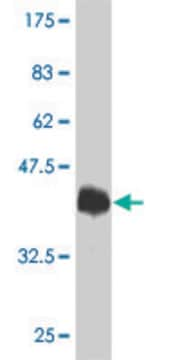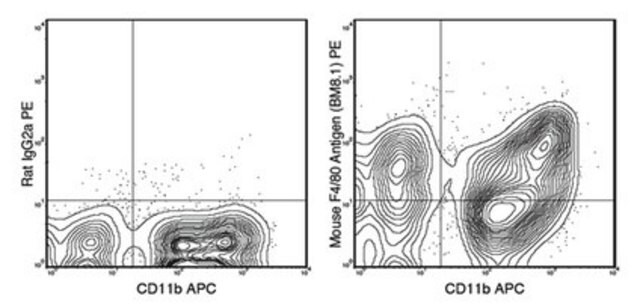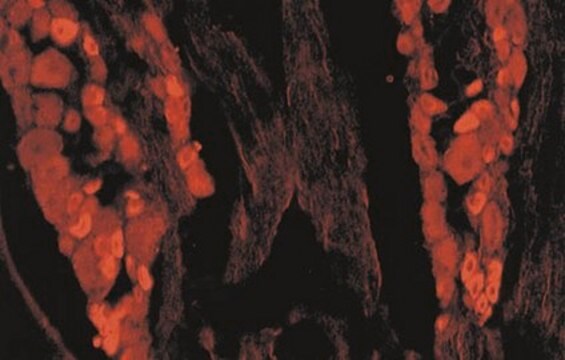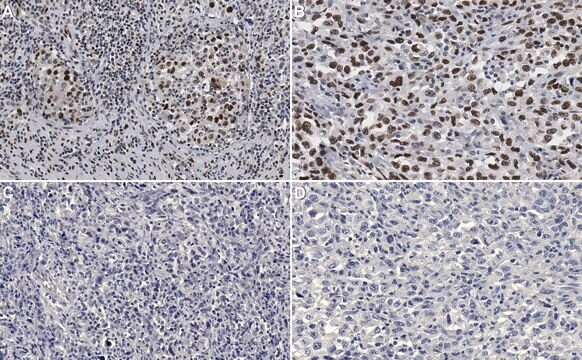AB5370
Anti-Capsaicin Receptor Antibody, CT
serum, Chemicon®
Synonym(s):
Vanilloid Receptor 1, VR1
Sign Into View Organizational & Contract Pricing
All Photos(1)
About This Item
UNSPSC Code:
12352203
eCl@ss:
32160702
NACRES:
NA.41
Recommended Products
biological source
rabbit
Quality Level
antibody form
serum
antibody product type
primary antibodies
clone
polyclonal
species reactivity
rat, human
manufacturer/tradename
Chemicon®
technique(s)
immunohistochemistry: suitable
NCBI accession no.
UniProt accession no.
shipped in
dry ice
target post-translational modification
unmodified
Gene Information
human ... TRPV1(7442)
Specificity
Capsaicin Receptor (Vanilloid Receptor 1, VR1).
Immunogen
A 21 amino acid peptide corresponding to the C-terminus of the rat Capsaicin Receptor protein.
Epitope: C-terminus
Application
Detect Capsaicin Receptor using this Anti-Capsaicin Receptor Antibody, C-terminus validated for use in IH.
Immunohistochemistry: 1:2,000. The antibody reacts well with tissue from the rat dorsal root ganglia.
Optimal working dilutions must be determined by end user.
Optimal working dilutions must be determined by end user.
Research Category
Neuroscience
Neuroscience
Research Sub Category
Neuroinflammation & Pain
Neurotransmitters & Receptors
Neuroinflammation & Pain
Neurotransmitters & Receptors
Physical form
Serum. Lyophilized. Contains no preservative. Reconstitute with 50 μL of sterile distilled water. Centrifuge if necessary to remove any residue.
Storage and Stability
Maintain lyophilized material at -20°C to -70°C for up to 6 months. After reconstitution maintain frozen at -20°C in undiluted aliquots for up to 6 months. Avoid repeated freeze/thaw cycles.
Legal Information
CHEMICON is a registered trademark of Merck KGaA, Darmstadt, Germany
Disclaimer
Unless otherwise stated in our catalog or other company documentation accompanying the product(s), our products are intended for research use only and are not to be used for any other purpose, which includes but is not limited to, unauthorized commercial uses, in vitro diagnostic uses, ex vivo or in vivo therapeutic uses or any type of consumption or application to humans or animals.
Not finding the right product?
Try our Product Selector Tool.
Storage Class Code
11 - Combustible Solids
WGK
WGK 1
Flash Point(F)
Not applicable
Flash Point(C)
Not applicable
Certificates of Analysis (COA)
Search for Certificates of Analysis (COA) by entering the products Lot/Batch Number. Lot and Batch Numbers can be found on a product’s label following the words ‘Lot’ or ‘Batch’.
Already Own This Product?
Find documentation for the products that you have recently purchased in the Document Library.
Emily M Besecker et al.
Experimental neurology, 323, 113092-113092 (2019-11-08)
Dramatic impairment of gastrointestinal (GI) function accompanies high-thoracic spinal cord injury (T3-SCI). The vagus nerve contains mechano- and chemosensory fibers as well as the motor fibers necessary for the central nervous system (CNS) control of GI reflexes. Cell bodies for
Otilia Obreja et al.
European journal of pain (London, England), 12(6), 775-789 (2008-01-26)
Hyperpolarization-activated cyclic nucleotide-gated (HCN) channels contribute to stabilizing resting membrane potential, thus controlling neuron excitability. Subclasses of nociceptive neurons differ in their excitability, therefore, these channels could be a distinguishing marker. We investigated isolated dorsal root ganglion neurons from a
Inge Brouns et al.
American journal of respiratory cell and molecular biology, 28(3), 275-285 (2003-02-21)
The characteristics of the different populations of sensory nerve terminals that selectively contact pulmonary neuroepithelial bodies (NEBs) in rat lungs were investigated after chemical denervation with capsaicin and compared with control lungs. Vagal calbindin D28k and P2X(3) purinoceptor immunoreactive (IR)
Jianzhong Lu et al.
PloS one, 16(1), e0243903-e0243903 (2021-01-08)
Tinnitus, the phantom perception of sound, often occurs as a clinical sequela of auditory traumas. In an effort to develop an objective test and therapeutic approach for tinnitus, the present study was performed in blast-exposed rats and focused on measurements
Our team of scientists has experience in all areas of research including Life Science, Material Science, Chemical Synthesis, Chromatography, Analytical and many others.
Contact Technical Service








